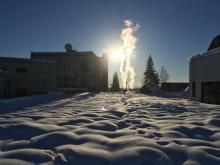What Are They Doing?
Mr. Beckendorf and the team worked on the Antarctic Automatic Weather Stations Project deploying, supporting, and maintaining a network of instruments that take automated weather measurements throughout the year. The data are transmitted via satellite in real-time and the sites themselves require relatively little upkeep. Since the beginning of the project in 1980, there have been approximately 100 weather stations deployed across Antarctica, largely powered through solar energy. The Antarctic Automatic Weather Stations are a very important part of many scientific projects taking place in Antarctica, as these stations provide the only weather measurements available on most parts of the continent.
Where Are They?
The research team was based out of McMurdo Station, the largest base in Antarctica. The team also had the opportunity to travel to other weather station sites outside of the McMurdo area.
Latest Journals
Jonathan Thom is an Associate Researcher at the Space Science and Engineering Center at the University of Wisconsin. He received a Masters degree from the University of Wisconsin in Atmospheric Sciences. His research interests include meteorological instrumentation and polar climates. Mr. Thom has worked for the Automatic Weather Station project for seven years and has worked in Antarctica for ten seasons.
George Weidner has worked on the automatic weather station program at the University of Wisconsin since 1981. During that period, he has participated in 20 field seasons in Antarctica and four field seasons in Greenland. His work includes the design, building, maintenance, and processing of data from weather stations for field programs in Antarctica, Greenland, and Peru. Mr. Weidner holds Bachelors and Masters degrees in Astronomy and Meteorology from the University of Wisconsin.
Shelley Knuth is a researcher at the Antarctic Meteorological Research Center at the University of Wisconsin. Ms. Knuth holds Bachelors and Masters degrees in Atmospheric and Oceanic Sciences from the University of Wisconsin. Ms. Knuth’s current research interests include precipitation and snow accumulation.


